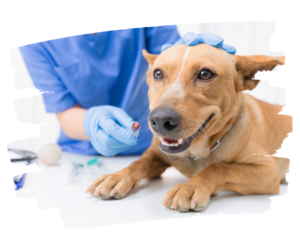Hey there, dog parents!
We’ve all had those sleepless nights, tossing and turning while our dogs, more specifically our furry friends, scratch and sneeze away. When it comes to pet health and dog allergies, these are a prevalent issue, sapping the joy out of your pet’s life.
So you make that inevitable vet visit, hearing the standard pet care advice: swap the dog food, avoid certain grass types, and try new allergy medications. Managing canine allergies can feel like a full-time job, particularly when you’re administering pet medications your dog thinks are chew toys, not pills.
Enter canine probiotics: the emerging buzzword in pet wellness. These probiotics aren’t exclusive to human health; they’re gaining traction in animal care too. The question remains, can these ‘beneficial bacteria’ make a significant impact on your dog’s allergy symptoms, or is this just another wellness trend?
🦠🐾The Lowdown on Probiotics🦠🐾
So, you’ve probably heard the word “bacteria” and thought, “Yuck, get it away from me,” right? But not so fast. Bacteria are not all villains; some are actually superheroes for our health. Picture this: your dog’s gut is like a bustling city, and bacteria are the citizens. You’ve got the good guys and the bad guys. When the bad ones take over, that’s when things go south. Probiotics are like the community heroes that help keep the peace. They balance things out so the bad bacteria can’t cause a ruckus.
Now, you might wonder, “Okay, cool, but how does this relate to my dog’s constant scratching and allergies?” Well, think of the gut as a control center for the immune system. If things are chaotic down there, you can bet the immune system won’t function at its best. A glitch in the immune system can lead to all kinds of stuff, including those pesky allergies that make your pup miserable.
So, back to scientists like Dr. Emma Allen-Vercoe. What she and her team have been looking at is how these good bacteria actually do their thing. The idea is that they strengthen the gut wall, help with digestion, and even produce some natural anti-inflammatory substances. That’s like having a home security system, a personal chef, and a health coach all rolled into one, right there in your gut—and by extension, in your dog’s gut too.
Another cool fact? These good bacteria also communicate with immune cells and can help ‘train’ the immune system to tell the difference between actual threats and harmless stuff like pollen or dander. That’s like upgrading your home security system to identify not just burglars but also when you’ve just forgotten your keys. It’s a smarter, more balanced system.

🤧🐶How Does This Affect Allergies?🤧🐶
Alright, let’s get into the nitty-gritty of how gut health might connect to those annoying allergies your dog can’t shake.
Imagine your dog’s immune system as a sort of security team. Its job is to spot the bad guys, like viruses and bacteria, and show them the door. Allergies happen when this security team gets a bit overzealous and starts kicking out harmless stuff too, like pollen or certain foods. It’s like if your home security system mistook the mail carrier for an intruder—annoying and unnecessary, right?
Now, where does the gut come in? Well, a big part of the immune system is actually located in the gut. Yeah, who knew? If the gut is healthy, it helps the immune system do its job more accurately. Dr. Susan H. Erdman’s work suggests that a well-balanced gut might help the immune system chill out a bit, so it doesn’t freak out every time it encounters something harmless like pollen.
What’s even more interesting is the idea that the gut can send signals to other parts of the body. We’re talking about inflammation here. Inflammation is basically the body’s way of fighting off stuff it doesn’t like. But too much inflammation can lead to issues, including allergic reactions. A healthy gut can help keep inflammation in check, so it doesn’t go overboard and cause more problems.
So, let’s say you get those good bacteria—probiotics—into your dog’s system. The idea is they’d help balance things out, make the gut’s environment more friendly, and, fingers crossed, help that immune system get better at its job. We’re talking fewer red alerts for harmless stuff, which could mean less itching, scratching, or other allergic symptoms for your pup.
Still with me? Great. The catch is, while this all sounds pretty awesome, it’s not a guaranteed fix. Dogs are as individual as we are, and what helps one might not do squat for another. Plus, the research is promising but still kind of in the early stages.
👩⚕️🗨️What do the Pros Say?👩⚕️🗨️
So you’ve heard all the buzz about probiotics, and it sounds like a simple enough fix, right? Just sprinkle some of that good bacteria into your dog’s dinner and watch those allergies magically disappear. If only it were that easy!
Dr. Scott Weese, who’s got the science cred to back up his claims, says not so fast. According to him, the market’s flooded with products that say “probiotic” on the label but might not have enough of the good stuff to make a difference. In some cases, these products can be duds, and you’ll be tossing your money down the drain.
Now, you might be wondering, “How the heck do I know what’s good and what’s not?” That’s where your vet comes in. Your vet isn’t just there to give shots and do the usual check-ups; they can be a treasure trove of info on stuff like this. Consulting with your vet can help you sift through the sea of products out there to find one that’s high quality and suitable for your specific dog’s needs. It’s like having a personal shopper, but for your dog’s gut health.
Here’s the kicker, different breeds, sizes, and even individual dogs can respond differently to probiotics. Your petite Chihuahua isn’t going to need the same dosage as a towering Great Dane. It’s a bit like humans with coffee—what keeps one person awake for days might just give another a slight buzz.
📈👓A Case for the Trendy📈👓
So, we’re all curious—what’s a trend and what’s a game-changer, right? Now, there’s some strong backing from scientists when it comes to humans and probiotics. You’ll find loads of studies talking about how they can help with everything from gut issues to mental health. It’s not a stretch to wonder if our dogs could benefit in the same way.
But here’s the rub: the research on dogs is still a bit thin. We’ve got some interesting hints, a study here and there, but nothing that makes you go, “Ah-ha, this is it!” That said, just because the science hasn’t caught up doesn’t mean the trend isn’t onto something.
Look at it this way: certain foods like kefir and sauerkraut have been around for centuries. People didn’t need a lab report to know it made them feel better. Fast forward to today, and we’re seeing probiotics pop up in everything from breakfast cereals to skincare products. The trend has sort of seeped its way into daily life for many people. And naturally, when we find something good, we want to share it with our four-legged friends.
So, what does this mean for your dog’s allergies or general health? Well, it could mean that while the scientific community is dotting the i’s and crossing the t’s, you might be onto a beneficial lifestyle change for your pet. A sort of “you heard it here first” situation.
But—and it’s a big but—always keep your vet in the loop. If people can have adverse reactions to supplements and new health trends, dogs can too. So before you start any new regimen, get some expert advice tailored to your own pup’s needs.
🔍👏In Conclusion🔍👏
Alright, here’s the deal. Probiotics aren’t a magic wand you can wave and—poof!—allergies gone. But they’re not snake oil either. Think of them as a helpful sidekick in your dog’s overall health journey. Still, because this is pretty new territory in pet care, it’s crucial to get your vet’s input. A quick chat could save you a lot of time, money, and, most importantly, keep your dog from going through unnecessary discomfort.
Let’s be real for a second. When it comes to our dogs, we’re willing to move mountains, right? So even though probiotics are in trend territory right now, if there’s a chance they could help, isn’t it worth checking out? But remember, while probiotics could be a good thing, they aren’t the only thing. There’s no substitute for quality vet care, a balanced diet, and keeping up with your dog’s overall wellness.
So, what’s your take? Ready to give probiotics a shot or still on the fence? Honestly, either way is cool. What’s important is that we’re having the conversation. Pet health is always evolving, and it’s pretty exciting to think about where we might be in a few years, with more research and maybe even some breakthroughs.
Just like with any health trend, staying informed and keeping an open mind could go a long way. Whether you’re all in on probiotics or waiting to see how the science shakes out, the fact that you’re engaged means you’re already doing a great job as a pet parent. Keep asking questions, keep being curious, and most importantly, keep doing what’s best for your four-legged family member.
For more interesting articles like this, and for LOTS of interesting PDFs don’t forget to join our Facebook group! You can also contact us at 385.442.7768 with any questions!





